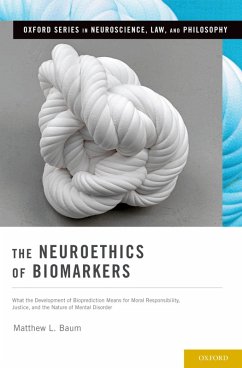Neuroscientists are mining nucleic acids, blood, saliva, and brain images in hopes of uncovering biomarkers that could help estimate risk of brain disorders like psychosis and dementia; though the science of bioprediction is young, its prospects are unearthing controversy about how bioprediction should enter hospitals, courtrooms, or state houses. While medicine, law, and policy have established protocols for how presence of disorders should change what we owe each other or who we blame, they have no stock answers for the probabilities that bioprediction offers.
The Neuroethics of Biomarkers observes, however, that for many disorders, what we really care about is not their presence per se, but certain risks that they carry. The current reliance of moral and legal structures on a categorical concept of disorder (sick verses well), therefore, obscures difficult questions about what types and magnitudes of probabilities matter. Baum argues that progress in the neuroethics of biomarkers requires the rejection of the binary concept of disorder in favor of a probabilistic one based on biological variation with risk of harm, which Baum names a "Probability Dysfunction." This risk-reorientation clarifies practical ethical issues surrounding the definition of mental disorder in the DSM-5 and the nosology of conditions defined by risk of psychosis and dementia. Baum also challenges the principle that the acceptability of bioprediction should depend primarily on whether it is medically useful by arguing that biomarkers can also be morally useful through enabling moral agency, better assessment of legal responsibility, and fairer distributive justice.
The Neuroethics of Biomarkers should be of interest to those within neuroethics, medical ethics, and the philosophy of psychiatry.
Dieser Download kann aus rechtlichen Gründen nur mit Rechnungsadresse in A, B, BG, CY, CZ, D, DK, EW, E, FIN, F, GR, HR, H, IRL, I, LT, L, LR, M, NL, PL, P, R, S, SLO, SK ausgeliefert werden.


